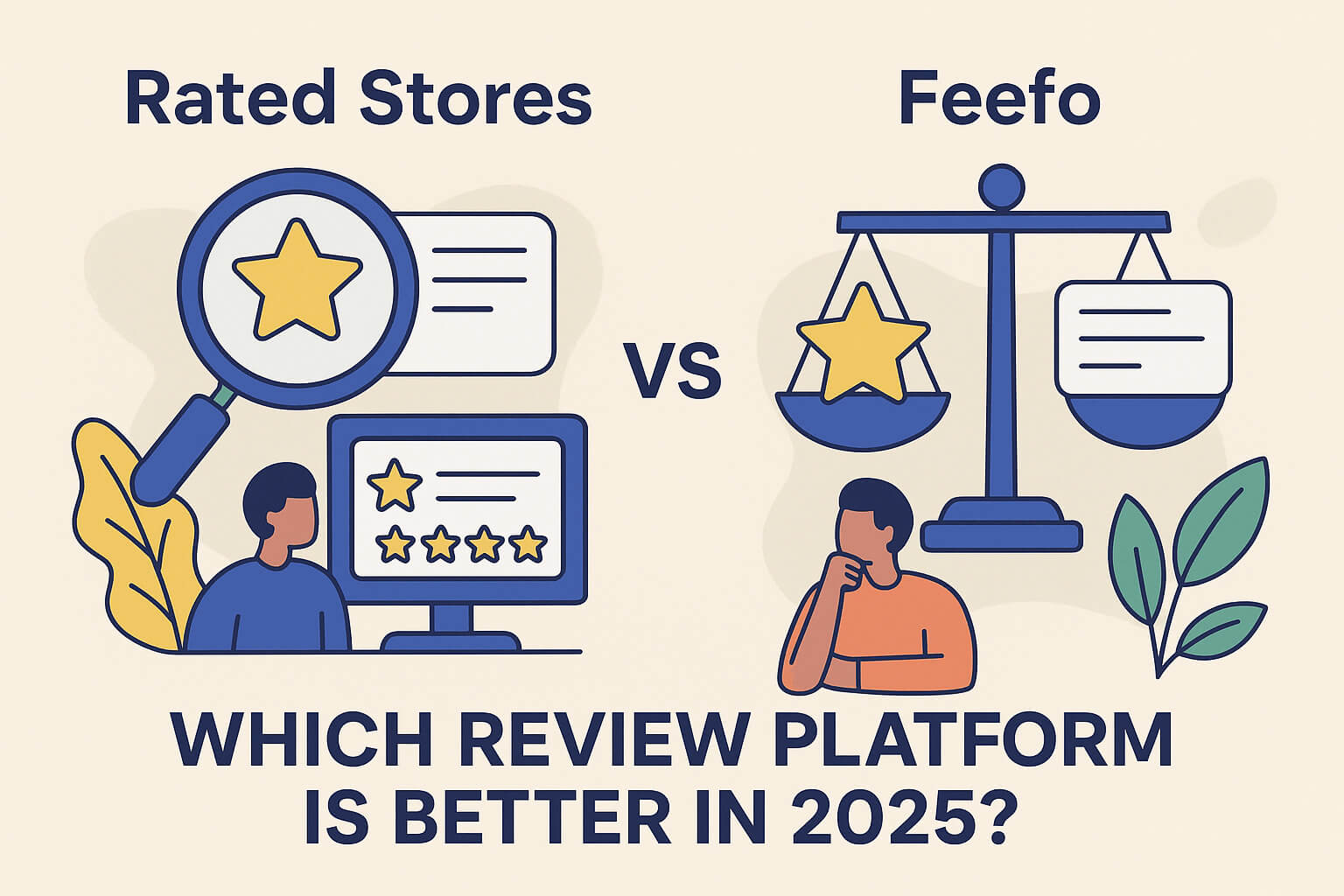When choosing a review platform, businesses often compare Rated Stores and Feefo. Both allow companies to collect customer feedback and showcase reviews online, but the way they operate — and the trust they build with consumers — is very different.
In this guide, we’ll explore Rated Stores vs Feefo in detail, highlighting how they differ in transparency, scoring, pricing, features, and long-term value. By the end, you’ll know which platform best suits your business in 2025.
🏆 Quick Comparison: Rated Stores vs Feefo
| Feature | Rated Stores ✅ | Feefo ⚠️ |
|---|---|---|
| Transparency | Open, unbiased, all reviews visible | Only verified customer reviews, heavily filtered |
| Consumer Visibility | Public-facing platform for research | Seen mostly on business websites |
| Pricing | Simple and transparent | Tiered pricing, often costly for SMEs |
| Ease of Use | Straightforward, minimal setup | Requires integration and training |
| Review Collection | Organic + invites, balanced | Invite-only verified reviews |
| Fake Review Protection | Algorithmic detection of manipulation | Relies on purchase verification only |
| Business Types | Universal: online, offline, B2B, services | Focused mainly on retail and services |
| Review Ownership | Exportable and portable | Reviews tied to Feefo’s ecosystem |
🔎 What is Feefo?
Feefo is a UK-based review platform best known for its verified-only approach. This means businesses can only collect reviews from confirmed customers who made a purchase, aiming to eliminate fake reviews.
- Target audience: Traditionally retail, travel, insurance, and service-based businesses.
- Strengths: Strong credibility in industries where verified purchase proof is important.
- Weaknesses: Lacks consumer-side visibility. Since reviews live mostly on business websites (via widgets), discovery outside those sites is limited.
Feefo has been a trusted player for years, but its invite-only model means customers who want to leave feedback without an invite are excluded — which can skew the true sentiment of the customer base.
🔎 What is Rated Stores?
Rated Stores is a next-generation review platform built around transparency, fairness, and consumer trust.
- Universal: Works for all businesses, including services, local companies, B2B, and eCommerce.
- Algorithmic scoring: Goes beyond averages, factoring in suspicious activity to prevent manipulation.
- Consumer-facing: Customers can find and compare businesses directly on Rated Stores — it’s not just a widget but a research tool.
- Balanced collection: Accepts both organic and invited reviews, weighting them fairly to reduce bias.
- Data ownership: Businesses can export their reviews — no lock-in.
⚖️ Detailed Comparison
1. Transparency
- Rated Stores: All reviews are visible; businesses cannot selectively hide negative feedback.
- Feefo: Shows verified reviews only — but excludes customer feedback from those not invited, which can present a one-sided picture.
2. Consumer Visibility
- Rated Stores: Reviews live on a public platform, making them accessible to potential customers searching for a business.
- Feefo: Reviews are usually displayed on the business’s own site or via widgets, which means they have limited independent reach.
3. Pricing
- Rated Stores: Clear, fair, and affordable pricing suitable for businesses of all sizes.
- Feefo: Uses tiered pricing, which can become expensive for SMEs. Often better suited to larger companies with dedicated budgets.
4. Fake Review Protection
- Rated Stores: Detects unusual patterns (e.g., sudden surges in 5-star reviews) to ensure scores are reliable.
- Feefo: Relies solely on verified purchase data, which reduces fake reviews but also excludes genuine feedback (e.g., service-only interactions without purchase proof).
5. Review Collection
- Rated Stores: Accepts both organic reviews (from any customer) and invited reviews, ensuring inclusivity.
- Feefo: Strictly invite-only. While this protects against fakes, it risks biasing results toward customers most likely to respond to requests.
6. Business Types
- Rated Stores: Designed to be universal, from local trades to SaaS companies.
- Feefo: Traditionally strong in retail, travel, and insurance, but less flexible outside those niches.
7. Review Ownership
- Rated Stores: Businesses can export their data anytime, ensuring they maintain control.
- Feefo: Reviews are tied to Feefo’s platform, creating a degree of vendor lock-in.
🚀 Why Businesses Choose Rated Stores Over Feefo
- Fairness → Rated Stores includes organic feedback as well as invited reviews, reducing bias.
- Consumer Discovery → Customers actively use Rated Stores to search, compare, and research businesses.
- Advanced Scoring → The algorithm flags manipulation and produces truer trust scores.
- Accessibility → Affordable pricing for businesses of all sizes.
- Universal Fit → Works for online, offline, B2B, and service companies — not just retail.
🤔 Should You Use Rated Stores or Feefo?
- Feefo is a good choice if your business needs verified purchase-only reviews and you’re in industries like travel, retail, or insurance. It’s trusted but limited in scope and flexibility.
- Rated Stores, however, offers a broader, fairer, and more transparent solution for any business type.
If your goals are:
- To build authentic consumer trust
- To appear on a platform customers actually use to research businesses
- To avoid being locked into high-cost plans
👉 Then Rated Stores is the better choice in 2025.
🔗 Related Landing Pages
🔗 Related Blog Posts
Final Verdict: Rated Stores vs Feefo
Feefo has built a strong reputation for verified-only reviews, but that same strength can also be a limitation — excluding valid customer voices and offering limited consumer visibility.
Rated Stores, by contrast, provides a transparent, universal, and consumer-facing platform designed to build long-term trust. With fair scoring, public discovery, and open data ownership, it’s a smarter choice for most businesses in 2025.
👉 Start building trust today with Rated Stores.
